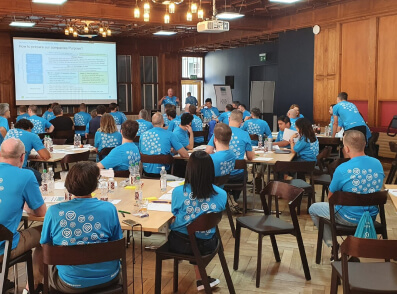How data-driven weight loss is a shortcut to lower healthcare costs
Key takeaways
- Evidence strongly suggests that even a BMI reduction directly translates into significant healthcare cost savings (e.g., a 5% BMI reduction is associated with 7-8% lower annual spending). For insurers and providers, managing population weight is one of the most effective strategies for improving the loss ratio and controlling healthcare spending.
- The financial returns on weight loss are only realized if behavior change is sustained over time. The key challenge for traditional programs—high drop-off rates—is overcome by focusing on frequent, measurable engagement.
- The dacadoo Digital Health Engagement Platform (DHEP) is not simply a wellness app—it’s a user engagement and risk mitigation tool. Its functionality drives the sustained behavior that actively reduces aggregate BMI and systematically lowers healthcare costs at scale.
- The DHEP allows senior decision-makers to move from being a reactive payer of claims to a proactive manager of risk. Providing granular engagement and risk data, dacadoo grounds the ROI of preventive health in credible, actuarial-grade metrics.
The real-world financial returns of weight loss
The economic argument for investing in weight management is fairly clear. Aside from the McKinsey study, a host of recent actuarial and health economics research quantifies the return on investment (ROI) of reducing BMI:
The JAMA Network Open Insight (2024): This landmark study provided a sharp focus on the direct correlation between BMI reduction and lower healthcare costs. It found that a 5% reduction in BMI is associated with approximately 7–8% lower annual health care spending. What’s more, a 25% reduction in BMI was associated with savings of about 31–34%. These aren’t marginal figures—they represent vast potential cost-savings for payers and providers.
Real-world ROI from digital interventions: Supporting this, a study on a digital intensive lifestyle intervention (ILI) showed that a modest weight loss of approximately 4.4% led to a 14% reduction in healthcare costs and an impressive 2.0:1 ROI over three years.
Actuarial perspectives: Reports from bodies like the Society of Actuaries (SOA)—supported by experts like dacadoo’s own Head of Market Development and Growth North America, Blake Hill—consistently show that employer-wellness programs focusing on weight loss and maintenance deliver meaningful financial savings.
For every dollar spent on proactive, effective weight management, there’s a high probability of reduced claims and improved loss ratios.
The challenge of sustaining behavior change

The primary obstacle to realizing this ROI is not a lack of digital health platforms, but a lack of sustained engagement. It’s a story we’re all familiar with when it comes to health programs—we all start strong, then give up after a few weeks, as if nothing had ever happened. As Deloitte points out, the ROI of weight loss programs is intrinsically linked to adherence and long-term behavior change.
The key to long-term success is the concept of frequency over intensity. Better outcomes are driven by consistent, low-intensity daily engagement rather than initial bursts of high-intensity effort that aren’t maintained. The real value lies in embedding healthy choices—around activity, sleep, nutrition, and stress—into a user’s daily routine.
dacadoo’s DHEP: Engagement that drives measurable ROI
dacadoo’s Digital Health Engagement Platform is purpose-built to solve the challenge of sustained engagement. A scientifically proven technology, it uses a potent combination of behavioral science, gamification, social activities, and a dynamic Health Score to keep users actively involved.
Driving sustained, daily behavior: The platform’s core features—from tracking over 120 lifestyle factors to social challenges and personalized goals—encourage consistent, daily interaction. This focus on frequency lies at the heart of dacadoo’s high level of engagement, with 71% of monthly users actively engaging and a 7x higher retention rate after 30 days than industry standards. It’s this sustained use that serves as the engine of long-term weight management.
Focusing on the right metrics: Users are encouraged to make daily choices that impact their weight and overall health—from logging sleep and activity to making nutrition choices. The platform provides a clear incentive structure through rewards for healthy behavior that include insurance premium discounts, wearable device subsidies, travel perks, gift cards, and cash back.
Providing actuarial-grade data: For insurers and providers, the DHEP offers more than just activity data—it provides granular engagement data that can be tracked. This allows our partners to measure the effectiveness of the platform—moving from a subjective “wellness” conversation to a data-driven ROI discussion.
Scalable and flexible deployment: The platform is designed for efficient, large-scale deployment. Whether through a White Label solution, the DHEP-API for a custom build, or a ready-to-use SaaS model, dacadoo scales efficiently, delivering a low cost-to-serve per member compared to traditional programs.
Moving beyond claims: The value of cost-avoidance

For senior decision-makers in the health industry, dacadoo’s DHEP helps drive the strategic shift from being a reactive payer of claims to a proactive manager of risk. More than just a collection of wellness tools, our DHEP is a digital risk mitigation system that methodically converts behavioral science into a tangible financial outcome.
Offering sustained and measurable engagement, the platform helps to reduce a population’s aggregate BMI and the long-term claims liabilities that come with it. And this is the true, measurable ROI of engagement: a financially sound, healthier future for both your customers and your business.
To find out more about dacadoo’s DHEP, our soon-to-be-available AI Agentic Coach (coming in 2026), and how we can help drive your organization toward a healthier future, you can contact us here.
*The AI Agentic coach will be available in early 2026.



















